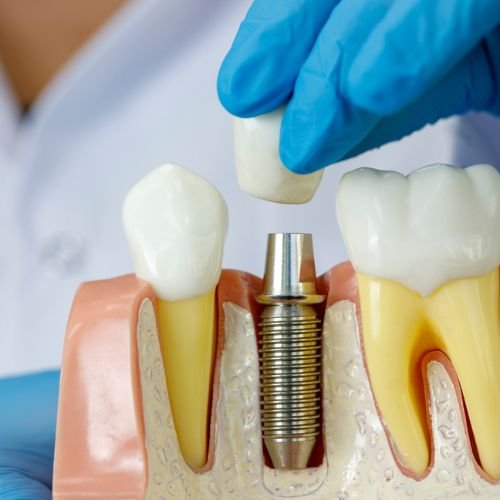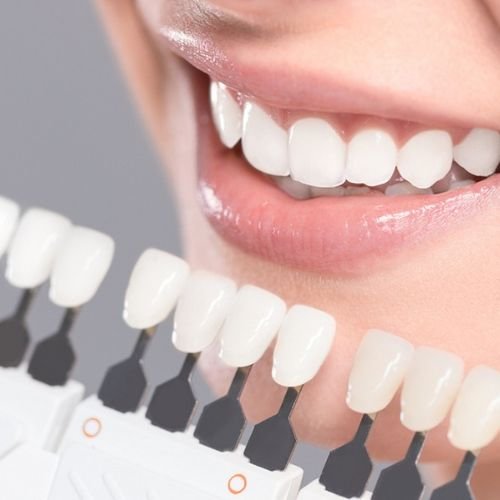Dental veneers have skyrocketed in popularity over the years. Today, these dental restorations are no longer reserved for celebrity A-listers. People from all walks of life have experienced life-changing smiles through this cosmetic dentistry treatment. Dental veneers are one of the most frequent choices by people with aesthetic flaws in teeth, including gaps, discolouration, and alignment issues. Veneers are an effective non-invasive method of obtaining a beautiful smile transformation for people with healthy teeth.
If you’re considering dental veneers, you’re probably wondering what they are, what they cost, and how long they’ll last. In this blog post, we’ll answer all your questions and give you a basic overview of the dental veneer process. Keep reading to learn more!
What Are Dental Veneers?

Dental veneers are thin, tooth-coloured shells of ceramic (porcelain) or composite resin material bonded to the front of teeth. This type of dental procedure is usually performed to improve the esthetics of a smile or to protect the surface of teeth. Veneers are ideal for patients with several cosmetic dental issues. In addition, dental veneers can be used to change the shape, colour, and alignment of teeth.
Different Types Of Dental Veneers
There are several types of dental veneers available on the market today. These are:
- Porcelain Veneers
- Composite Resin Veneers
- Removable Veneers
- Palatal Veneers
Each type has its own benefits and drawbacks, so it is essential to consult with a dental professional to determine which type is right for you.
Porcelain Veneers
Porcelain dental veneers are one of the most popular types of veneers. They are made from a thin layer of porcelain that is applied to the front surface of the tooth. Porcelain veneers are highly resistant to staining and wear, and they can be colour-matched to your natural teeth. However, they are also one of the most expensive types of veneers.
Composite Resin Veneers
An alternative to porcelain veneers, composite dental veneers are made from a composite resin material applied directly to the tooth surface. Composite veneers cost less compared to porcelain veneers, but they are also more susceptible to staining and wear over time.
Removable Veneers
Removable veneers are snap-on, custom-made teeth, and are considered the more affordable veneers. They’re less invasive than conventional veneers, non-permanent, and less expensive. With removable veneers, tooth reduction is no longer necessary. However, they may be unpleasant to wear and don’t blend well with natural teeth. Furthermore, they must be replaced often.
Palatal Veneers (Palatal Onlays)
When teeth on the back of the mouth need to be restored, an onlay is typically used. For anterior teeth restoration, palatal veneers are recommended by dentists. Palatal onlays only restore the tooth’s damaged area while leaving the undamaged parts intact.
Porcelain Veneers VS. Composite Resin Veneers
You can choose the type of veneer that best suits your preference and budget. Depending on your needs, your dentist can help you select the right type of dental veneer.
Here’s a quick look at the differences between porcelain veneers and composite resin veneers.
| Porcelain Veneers | Composite Resin Veneers | |
| Cost | More expensive | Less expensive |
| Durability | Less likely to fracture or chip | More likely to break or chip |
| Enamel Removal | Usually requires enamel removal | May not require enamel removal |
| Longevity | 10-15 years | 5-8 years |
| Repairability | Difficult to fix | Easier to fix |
| Staining | stain-resistant | May stain over time |
| Time | 2-3 dental appointments | Typically 1 dental appointment |
Take the first steps toward your perfect smile today!
Or Call Us : (08) 6495 4004
What Are The Benefits Of Getting Dental Veneers?

Dental veneers are a popular and effective treatment option for those looking to improve their smile. A dentist customizes these to fit seamlessly over the front surface of your teeth, concealing any visible damage or imperfections.It’s easy to see why many people have chosen dental veneers over other forms of cosmetic dental treatment. There are several benefits to getting dental veneers, including:
- Improved Aesthetic Appeal: Dental veneers can be used to cover up cracks, chips, stains, and other aesthetic issues in your smile. This can help you feel more confident when showing your teeth and boost your overall appearance.
- Protection Against Further Damage: By providing extra support to weakened teeth and preventing plaque buildup in hard-to-reach places, veneers can protect your teeth from decay and damage over time. This can help you avoid expensive and painful problems like cavities and infections.
- Improved Oral Health: Because veneers generally improve the aesthetics and health of your teeth, they can also have a positive impact on your overall oral health. This can include reduced plaque buildup, better hygiene habits, and improved confidence when speaking or smiling.
- Improved Self-Confidence: They can help increase your confidence by helping you feel good about the way you look when you smile.
If you’re considering cosmetic dental treatments like dental veneers, be sure to consider how they can make a difference not just in the way you look but in the way you feel too! Whether you’re seeking minor improvements or major changes to your smile, dental veneers may be the right choice for you.
How Do Dentists Install Veneers?
Veneer installation can take one to two days, depending on the type of veneer that you’ve chosen. Typically, dentists install veneers using the following steps:
- The dentist takes extra-oral photographs and x-rays. A thorough oral examination will also be done to determine suitability for dental treatment.
- The dentist will remove a small amount of tooth enamel.
- A teeth mould will be made using traditional putty or an intraoral scanner.
- A shade guide will be used to pick your veneer’s colour.
- The teeth mould and your chosen shade will be sent to a laboratory where they’ll create your custom veneers.
- Your dentist makes a temporary veneer. You’ll wear this as you wait for your final custom set.
- Your dentist will position and adjust your veneers correctly during your next dental visit. Your bite will also be checked.
- After adjustment, the dentist will permanently bond the veneers to the surface of your front teeth. Excess cement is scraped off.
Do Dental Veneers Stain?

Porcelain veneers are designed to be resistant to staining. They don’t stain as easily as natural tooth enamel, but they can discolour with time especially without proper care.
Dental enamel stains may occur after prolonged exposure to dark coloured beverages such as red wine and dark coffee. Because of this, proper care is required to guarantee that your veneers last a long time.
Other factors may result in veneer discolouration. These are:
- Biological Age. Aging causes gum recession. As a result, the gaps where the teeth meet the veneers become visible. Unfortunately, gum recession is irreversible. With constant exposure to dark coloured foods and drinks, the visible enamel becomes stained.
- Veneers Age. Some older porcelain veneers may not be made of porcelain. In the past, porcelain veneers made of plastic or porous material were used. They were more fragile than those used today.
- Damage Or Trauma. Your tooth’s dentin may become discoloured when it suffers damage. Veneers appear discoloured when the natural tooth becomes yellow due to the damaged dentin underneath them.
Possible Risks In Getting Dental Veneers
As with any other dental treatment, there are risks associated with dental veneers. However, they aren’t life-threatening. With appropriate attention, the risks and side effects may be avoided.
Possible risks associated with dental veneers include:
- Tooth Damage:
Enamel removal may cause damage to the underlying enamel. This can possibly damage the tooth. - Tooth Sensitivity:
It is common for patients to experience sensitivity to hot or cold foods and drinks in the first three weeks after veneer placement. Discuss any discomfort from cold or hot liquids with your dentist if it lasts more than three to six months. - Veneer Failure:
Veneers are more likely to fail in patients with untreated dental problems, such as enamel erosion. Your dentist may suggest composite bonding or crowns as alternatives to traditional veneers.
Is There Any Food You Need To Avoid With Veneers?
Eating with veneers on needs extra care. There are certain foods to avoid so that you don’t put your veneers at high risk for damage. Here’s a list of foods that you should avoid eating as much as possible:
- Apples and other fruits with hard skins
- Acidic foods and drinks
- Chewy foods and red meat
- Dark-coloured foods and drinks (coffee, red wine, tea, berries, tomatoes, etc.)
- Hard, toasty bread
- Hard candies
- Ice
- Sticky candies such as caramel and taffy
Tips On How To Maintain Your Dental Veneers

Veneers don’t come cheap. If you want value for your money, you need to put extra effort into making sure that your veneers last for a long time.
Fortunately, dental veneers don’t require high maintenance. They require the most basic upkeep to ensure functionality and longevity.
Here are some tips on how you could properly maintain your dental veneers:
- Don’t chew on hard objects like ice, pens, or candies.
- Don’t use your teeth when opening packages.
- Don’t bite your nails.
- Lessen your consumption of dark coloured food and drinks.
- Maintain good oral hygiene.
- Stop smoking.
- Schedule a follow-up visit and regular dental checkups.
- Use a soft-bristled toothbrush when brushing your teeth.
- Use a retainer, mouth guard, or a night splint if you clench or grind your teeth at night.
- When playing sports, wear a mouthguard.
Do Health Fund Cover Dental Veneers?
Most cosmetic and dental procedures fall under the “major dental” category for private health funds. This includes complex treatments like crowns and root canal surgery.
Both composite and porcelain veneers fall under the “major dental” category. Thus, they are covered by most private health funds.
How Much Do Veneers Cost?
Veneers are a great way to improve the appearance of your teeth. They’re more costly than other treatments since they rely on special materials and instruments but can do wonders with your smile with just a single visit.
Veneers are an investment, and many factors determine the cost of veneers. This includes the type of material, your dentist’s location and skills, and the number of veneers needed. The cost of materials varies depending on the aesthetic effect you would like. Porcelain materials are more costly than composite materials.
Depending on where you live in Australia, costs will vary from clinic to clinic. On average, a composite veneer costs between $400 and $900, whereas porcelain veneers range from about $1,800 to $2,500 or more.
Final Thoughts
If you are unhappy with the appearance of your teeth, dental veneers may be a good solution for you. Veneers can correct a variety of dental cosmetic issues and are available in a range of materials to match your needs and budget.
Talk to us about dental veneers and your other dental concerns. Contact us at (08) 6495 4004 to schedule a dental consultation with one of our experienced dentists. South Lake Smiles would be happy to answer your questions so that you can learn more about this treatment option and see if it is right for you.







